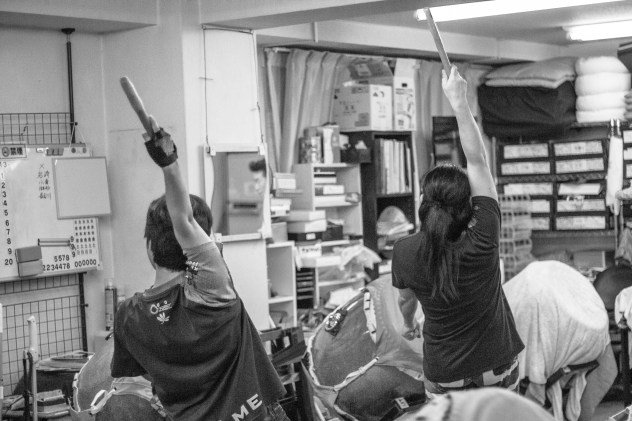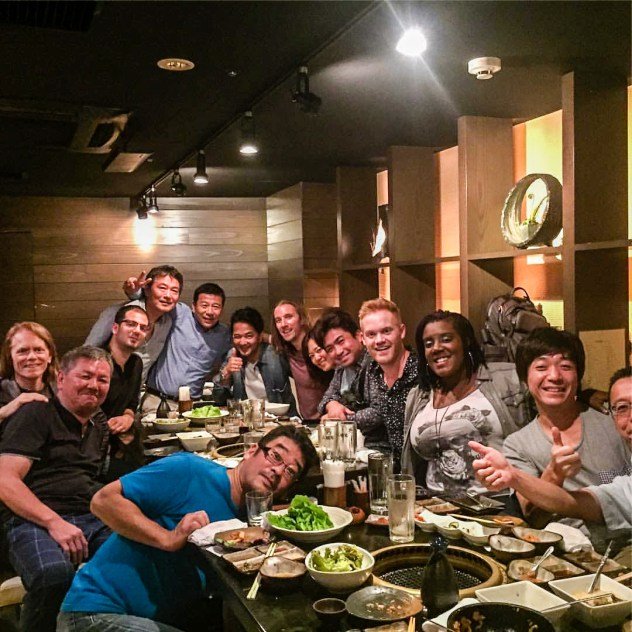After having recently returned from 5 weeks in Japan, I've had some time to reflect on the amazing time that I had there. I really am convinced that it was due to my 9 months of study to learn some basic Japanese. So I want to share 21 easy Japanese survival phrases for travel with you that helped me to meet people and make friends while in Tokyo and Osaka. Some are not quite grammatically correct and definitely less formal, but you will be understood and that's a good place to start.
The Japanese people are incredibly gracious and friendly and you will get smiles and laughs at your attempts to speak Japanese. Not because they are laughing at you, but because they are happy that you are trying to speak to them in their language.
I'm learning, with every trip to a new country, how important it is to be able to do at least the basics in the language of your destination.
So here we go with some basic words and phrases. Ikou!! (Let's Go!!)

Greetings
Arigatou Gozaimasu : The most essential of all phrases, it means "Thank You". It can also be shortened to a simple "Arigato" if gozaimasu is difficult to pronounce for you. * Tip : The "U "in "gozaimasU" is not pronounced. It sounds like "mas" if you speak Spanish. If you do speak Spanish the vowels are the same sounds, so you can sound words out with ease
Ohayou Gozaimasu : This means "good morning" and is totally appropriate to say to everyone you see in the morning. This can also be shortened to "Ohayou" but is less formal, be sure to smile when you say it at least. Sounds like "OHIO".
Kon ni chi wa : Means "hello" and can be used at all times if you need to remember one greeting phrases, but it is more accurately used as "Good Afternoon".
Kon ban wa : "Good Evening". Used once it's dark as a greeting in the same way you early said "Ohayou Gozaimasu" and "Kon ni chi wa".
Hajimemashite : Actually means “in the beginning” but translates to “nice to meet you” in practice and works fine along with a handshake when you meet someone new. Sounds like HA-GEE-MAY-MAASH-TE
Oyasumi nasai : "Good Night". When you're leaving and want to say goodbye to one person or multiple people. Can be shortened to "Oyasumi".
"Tip : If you speak Spanish the vowels are the same sounds, so you can sound words out with ease"
Being Polite
Douzo : You can say this is you want to give someone something. I found it most useful on the subway if you wanted to give an older person your seat. It's a very polite word and along with a gesture, you will certainly get a smile back. Sounds like "DO (like Go) ZO"
Chotto : I used this word quite a bit. It's most useful as a response to "do you speak Japanese?" or "you speak Japanese very well". Along with the common gesture with your finger and thumb that means "a little", it's a highly effective word. You're likely to hear this word if you ask them if they speak English as well.
Kudasai : My preferred word for "please". There is another way to say please, but "kudasai" is used when you are making a request of someone and comes in handy when ordering food and drinks.
Eigo Ga Hanasemasu Ka? : This phrase is a little more complicated and means "Do You Speak English". If I get into a taxi or meet new people at a bar, this phrases comes in handy as something to say first to see if you can also communicate with them in English. If they don't speak English, don't worry, try combining a few of the words listed and some English words and use hand gestures and before you know it, you'll have made friends for the evening. Language differences do NOT have to be a huge barrier.
Sugoi : The closest word to "awesome", but it's better used when you’re impressed by something then just yelling "sugoi" when you think something is cool.
Mata ashita : "See you later". When you know you’re going to see the person or group of people again. It's very informal but is fun to say once you've made friends. Say it while waving. Sounds like "MA TASH TA"
Dou Itashimashite : This short, but not so easy phrase to pronounce, is not really necessary but can be used as a response to "thank you" and basically means "you're welcome".
Daijoubu : I used this word VERY frequently and is a way to say "I'm ok", "no problem" or to ask "is this ok?". It comes in handy when asking if you can pay with a credit card or Suica card (refillable smart card used on the trains and convenience stores). Can be used as in "Credit card (or Suica) Daijoubu?". Which means roughly "Ok if I pay with a credit card". You say it with an upward inflection to ask the question. Sounds like "DIE-JOE-BOO"
Now for the fun phrases you can use at a bar or restaurant!

Nama Biiru Kudasai : "Draft Beer Please". When you just want a simple draft beer. Common draft brands include Sapporo and Kirin. Beers there are delicious and Japanese people tend to drink more beer than even sake or shochu.
Toriaezu, Biiru : If you wanna impress your Japanese friends or make new friends, give this phrase a try when you first get to a bar. It means "beer for now", but is a way to say that you're going to start with a beer and go from there. It's very colloquial and you may get smiles from other bar patrons will say "you speak very good Japanese". Many conversations began when locals heard me say this. It's how THEY order their beers, so give it a try!
Mou hitotsu kudasai : The Japanese language is very complicated. They use different word counters for objects of different size or shape. So there is a way to say 1 if it's a round object and entirely DIFFERENT word for if its long and thin. However, there is a generic word that means one. "Hitotsu" works when ordering food and drinks and if you want one more of whatever you have been drinking, "mou hitotsu kudasai" is the way to say it.
O-Kanjou kudasai : "Check Please"!
"...if you want one more of whatever you have been drinking, "mou hitotsu kudasai" is the way to say it."
Itadakimasu : Said before eating to whoever you are with or to your sushi chef. Equal to “Bon appétit” or “thanks for the food”.
Ijou (desu) : "That's all". Once you've finished your order, you can say this to let your waiter know you're done with you're done. Can just say "Ijou", but "Ijou Desu" is more accurate.
Ikou!! : "Lets Go"! Said with enthusiasm before going out.
Ijou! Thanx for reading!
Excellent post. Amazing. Well done. I believe we will enjoy and have amazing time here to collaborate and learn for other members through writing. I will be looking up to you sharing words of knowledge and wisdom. Please stay tuned for my write-ups and please follow me @yash0108